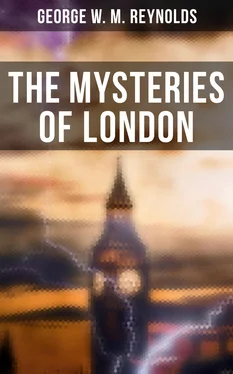He was interrupted in the middle of this occupation, by the entrance of Whittingham, who came to announce that two persons of somewhat strange and suspicious appearance desired an immediate interview with him.
Scarcely was this message delivered, when the two men, who had followed Whittingham up-stairs, walked very unceremoniously into the bed-room.
"This is Richard Markham, 'spose?" said one, advancing towards the young man.
"Yes—my name is Markham: but what means this insolent and unpardonable intrusion?"
"Intrusion indeed!" repeated the foremost of the ill-looking strangers. "However, not to keep you waiting, my young friend, I must inform you that me and this man here are officers; and we've a warrant to take you."
"A warrant!" ejaculated both Richard and Whittingham at the same moment.
"Come, come, now—I dare say you haven't been without your misgivings since yesterday;—but if young gen'lemen will play such pranks, why, they must expect some time or another to be wanted—that's all!"
"But what have I done?" demanded Richard. "There must be some mistake. I cannot be the person whom you require."
"Did you not call at a certain bankers' in the City yesterday?" demanded the officer.
"Certainly—I had some money to receive, which Mr. Monroe my guardian had paid into their hands for my use."
"And you changed a five hundred pound note? The clerk did it for your accommodation."
"I do not deny it: I required change. But how is all this connected with your visit?"
"That five hundred pound note was a forgery!"
"A forgery! Impossible!" cried Richard.
"A forgery!" said Whittingham: "this is really impudence of too consummating a nature!"
"Come, there's no mistake, and all this gammon won't do. Me and my partner came in a hackney-coach, which stands at the corner of the lane so if you're ready, we'll be off to Bow Street at once."
"I am prepared to accompany you," said Richard, "because I am well aware that I shall not be detained many minutes at the magistrate's office."
"That's no business of mine," returned the principal officer: then, addressing his companion, he said, "Jem, you'll stay here and take a survey of the premises; while I get off with the prisoner. You can follow as soon as you've satisfied yourself whether there's any evidence upon the premises."
It was with great difficulty that Richard over-ruled the desire of Whittingham to accompany him; but at length the faithful old man was induced to comprehend the necessity of staying behind, as an officer was about to exercise a strict search throughout the house, and Markham did not choose to leave his property to the mercy of a stranger.
This point having been settled, Richard took his departure with the officer in whose custody he found himself. They entered the hackney-coach, which was waiting at a little distance, and immediately proceeded by the shortest cuts towards the chief office in Bow Street.
Upon their arrival at that ominous establishment, Richard's pocket-book and purse were taken away from him; and he himself was thrust into a cell until the charge at that moment before the magistrate was disposed of.
Here must we leave him for the present; as during the night which followed his arrest, scenes of a terrible nature passed elsewhere.
CHAPTER XVII.
A DEN OF HORRORS.
Table of Contents
HOWEVER filthy, unhealthy, and repulsive the entire neighbourhood of West Street (Smithfield), Field Lane, and Saffron Hill, may appear at the present day, it was far worse some years ago. There were then but few cesspools; and scarcely any of those which did exist possessed any drains. The knackers' yards of Cow Cross, and the establishments in Castle Street where horses' flesh is boiled down to supply food for the dogs and cats of the metropolis, send forth now, as they did then, a fœtid and sickening odour which could not possibly be borne by a delicate stomach. At the windows of those establishments the bones of the animals are hung to bleach, and offend the eye as much as the horrible stench of the flesh acts repugnantly to the nerves. Upwards of sixty horses a day are frequently slaughtered in each yard; and many of them are in the last stage of disease when sent to their "long home." Should there not be a rapid demand for the "meat" on the part of the itinerant purveyors of that article for canine and feline favourites, it speedily becomes putrid; and a smell, which would alone appear sufficient to create a pestilence, pervades the neighbourhood.
As if nothing should be wanting to render that district as filthy and unhealthy as possible, water is scarce. There is in this absence of a plentiful supply of that wholesome article, an actual apology for dirt. Some of the houses have small back yards, in which the inhabitants keep pigs. A short time ago, an infant belonging to a poor widow, who occupied a back room on the ground-floor of one of these hovels, died, and was laid upon the sacking of the bed while the mother went out to make arrangements for its interment. During her absence a pig entered the room from the yard, and feasted upon the dead child's face!
In that densely populated neighbourhood that we are describing, hundreds of families each live and sleep in one room. When a member of one of these families happens to die, the corpse is kept in the close room where the rest still continue to live and sleep. Poverty frequently compels the unhappy relatives to keep the body for days—aye, and weeks. Rapid decomposition takes place—animal life generates quickly; and in four-and-twenty hours myriads of loathsome animalculæ are seen crawling about. The very undertakers' men fall sick at these disgusting—these revolting spectacles.
The wealthy classes of society are far too ready to reproach the miserable poor for things which are really misfortunes and not faults. The habit of whole families sleeping together in one room destroys all sense of shame in the daughters: and what guardian then remains for their virtue? But, alas! a horrible—an odious crime often results from that poverty which thus huddles brothers and sisters, aunts and nephews, all together in one narrow room—the crime of incest!
When a disease—such as the small-pox or scarlatina—breaks out in one of those crowded houses, and in a densely populated neighbourhood, the consequences are frightful: the mortality is as rapid as that which follows the footsteps of the plague!
These are the fearful mysteries of that hideous district which exists in the very heart of this great metropolis. From St. John-street to Saffron Hill—from West-street to Clerkenwell Green, is a maze of narrow lanes, choked up with dirt, pestiferous with nauseous odours, and swarming with a population that is born, lives, and dies, amidst squalor, penury, wretchedness, and crime.
Leading out of Holborn, between Field Lane and Ely Place, is Upper Union Court—a narrow lane forming a thoroughfare for only foot passengers. The houses in this court are dingy and gloomy: the sunbeams never linger long there; and should an Italian-boy pass through the place, he does not stop to waste his music upon the inhabitants. The dwellings are chiefly let out in lodgings; and through the open windows upon the ground-floor may occasionally be seen the half-starved families of mechanics crowding round the scantily-supplied table. A few of the lower casements are filled with children's books, pictures of actors and highwaymen glaringly coloured, and lucifer-matches, twine, sweet-stuff, cotton, &c. At one door there stands an oyster-stall, when the comestible itself is in season: over another hangs a small board with a mangle painted upon it. Most of the windows on the ground-floors announce rooms to let, or lodgings for single men; and perhaps a notice may be seen better written than the rest, that artificial-flower makers are required at that address.
Читать дальше












